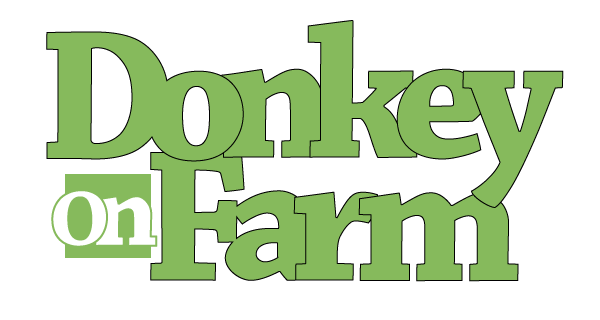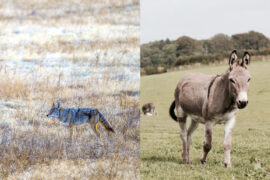Donkeys can be very vocal animals with a lot to say. Their sounds are quite unique and recognizable once you hear them. A donkey’s hee haw or braying noise that we so often hear is one of their best forms of communication, both with each other and with us humans.
A donkey hee haw
A donkey’s bray: Why do donkeys hee haw?
Donkeys hee haw or bray for various reasons depending on the situation the donkey is in or the donkey’s mood. One of the first most commonly known reasons for a donkey’s hee haw is that it is their primary method of communication with each other. It can also be a sign that the donkey is hungry, warning everyone of danger, or it could be to tell their owner or others that they are distressed or uncomfortable. It can also be simply because the donkey is happy and wants some love and affection.
Communication
One of the primary reasons that donkeys bray or make their signature hee haw sound is to simply communicate with one another, and sometimes to communicate with other animals and humans. The sound can travel hundreds of yards, so it is believed that donkeys used this type of communication when they were more often found in the wild to communicate with one another.
Food or hunger
Another reason that donkeys hee haw is simply to show that they are hungry and ready for a meal or for a snack. If a donkey is used to being given a treat whenever a person walks by, the donkey might run up to the fence and give several loud and proud hee haws whenever someone walks by. That donkey is definitely ready for its snack.
Warning of danger
Donkeys will often warn anyone who will listen of any impending danger. These warnings are just one of the reasons that many livestock farmers love to have donkeys on their property since they act as an alarm signal.
If a donkey sees any kind of predator, like a bear or a coyote, for example, it will make a lot of noise and defend itself and sometimes even the other animals in the pasture with it. This alarm system gives humans enough time to come outside and see the problem, hopefully before it becomes an even bigger problem.
Discomfort or distress
Another time that donkeys will bray or hee haw is when they aren’t feeling well. If they are in distress or are not comfortable for any reason, they will often hee haw loudly and relentlessly until their owner comes outside to check on them. This could be for any number of reasons. It could be something as simple as the donkey being ‘in distress’ because it wants a snack, or it could be something more serious like an injury. If a donkey is persistently braying, it would be best to check on it to ensure everything is okay.
Territorial
Sometimes donkeys, especially jacks, unneutered males, can become quite territorial over what they consider to be their own space or their own herd. For example, if in the wild, a single unknown jack walked into another jack’s herd, the lead jack of the herd might start braying as the first sign of aggression. This would be a statement to the other jack, telling him to get out and find his own territory.
Happiness and affection
Donkeys are also known to hee haw simply because they are happy or simply because they want affection or are enjoying the affection they are receiving. In ancient Chinese culture, some say a donkey’s hee haw is a symbol of ritualism and a symbol of friendship.
Are donkeys laughing when they hee haw?
No, but it certainly looks and sounds like it. A donkey’s hee haw almost sounds like a laugh, and their body language makes them look like they are laughing. They tend to throw their head up in the air and show their teeth in what almost looks like a smile. As much as it looks like a laugh, a donkey hee hawing isn’t laughing though it can certainly be expressing a certain emotion like fear or happiness.
Female vs. male donkey
Females absolutely can and do bray sometimes. Typically, though, they just do not bray as often or as loudly as their male counterparts. But when they do, it is often for all the same reasons as a male donkey, whether it be for communication, a sign of wanting affection, being hungry, distressed about a predator, or in pain.
Are there different types of hee haws?
Not all hee haws sound the same. Much like barks vary among dogs, so do brays and hee haws vary among donkeys. No two hee haws sound exactly the same. The tone, pitch, length, and frequency of the sound can vary greatly from donkey to donkey. And different meanings behind the noise may also make the noise sound different. For example, a distressed donkey’s bray might sound different than the bray of a donkey who is happy.
One of the most interesting things about a donkey’s hee haw is that they are making the noise both while exhaling and inhaling. When making the sound, a donkey vocalizes during the exhale of air, which produces the “haw” sound. When the donkey goes to inhale air and vocalizes, it produces the “hee” sound.
How to stop your donkey from braying?
Braying, or hee hawing rather, is a perfectly normal part of being a donkey and of being a donkey owner. You can’t stop it entirely, but if it is bothersome to you or to nearby neighbors, you can make sure you are feeding your donkey on a regular schedule and a regular amount. Make sure that they are as safe as possible from predators, and keep them company when they desire it. You might have to make time to come say hello if your donkey really likes you. Don’t be late for breakfast and dinner, and you should be just fine.
Conclusion
Whether you love it or hate it, there is no doubt that a donkey’s hee haw is incredibly unique. A donkey will hee haw to communicate with others, because it is hungry, to warn of danger, because it is in distress, because it is territorial, or to show happiness and affection. Hee hawing is a perfectly normal thing for a donkey to do. They sure do love to make some noise.

![Why Do Donkeys Hee Haw? [Hint: It’s Perfectly Normal] Why-Do-Donkeys-Hee-Haw](https://donkeyonfarm.com/wp-content/uploads/2022/06/Why-Do-Donkeys-Hee-Haw.jpg)

![Do Donkeys Laugh? [Plus Why Do They Do It?] do-donkeys-laugh](https://donkeyonfarm.com/wp-content/uploads/2022/08/Why-do-donkeys-laugh-270x180.jpg)

![Do Donkeys Make Good Pets? [Plus What to Know Before You Get One] Do-Donkeys-Make-Good-Pets](https://donkeyonfarm.com/wp-content/uploads/2022/05/Do-Donkeys-Make-Good-Pets-270x180.jpg)
![Are Donkeys Dangerous to Dogs? [Plus How to Keep Your Dog Safe] Are-Donkeys-Dangerous-to-Dogs](https://donkeyonfarm.com/wp-content/uploads/2022/07/Are-Donkeys-Dangerous-to-Dogs-270x180.jpg)